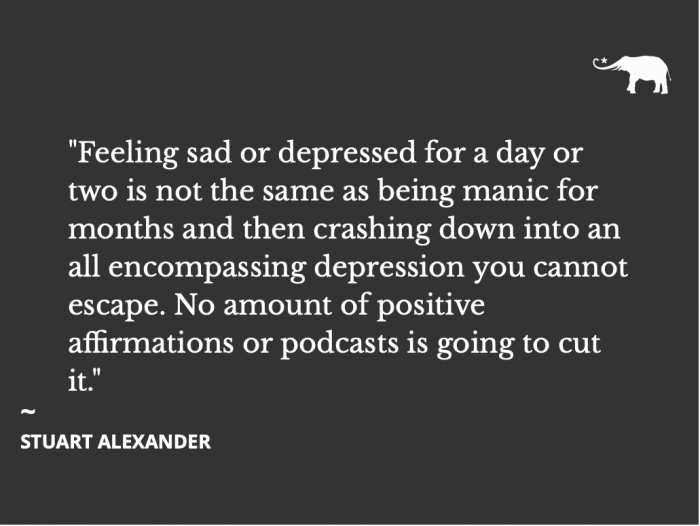The tortuous thing about suffering with bipolar is the soaring highs followed by the crushing lows.
At present, I am in one of the worst lows I’ve ever experienced.
The rain hammers down on the roof of the conservatory as I smoke at the back door. My mind flits from one perceived failure to another with lightning speed. I start to ruminate on the idea that maybe I have experienced all the positive experiences in my life and that I am only left with soul-tearing lows. The sympathetic background of the storm and the rain crashing down on the roof make me believe that I am cursed to suffer, and that the weather and God know it and encourage it eagerly.
What if I have enjoyed and used up all the good times life has to offer?
I have spent months trying to think my way out of the current depression and I am exhausted by myself. Everything, from waking up and getting out of bed, to working out what I should do with my life, drains the energy out of me. I swing from panic-induced anxiety to a defeated and sombre feeling of failure. In the movies everything is so neat and easy to understand: The protagonist has a problem and through human endurance they conquer and succeed at life. I don’t think this is true, at least not for me.
The place I find myself is grim and dark. I have nothing left to offer and feel destroyed and desperate by what life has thrown at me. The weather outside frames my internal state; there are no breaks in the cloud and floods of dark water submerge my mind in a whirlpool of despair. I cannot get out of this state of being and this state of being offers me no escape.
If you are drowning? How do you rescue yourself? Where is the hero or heroine who will sail in and rescue you? These thoughts make me suspicious of every film I have ever seen that shows human triumph. I cannot imagine being free of dark, swirling, suffocating depression—let alone being happy.
What if every human on earth is gifted at birth with a set number of positive experiences and potential opportunities? I’m scared I’ve used mine all up and am destined to suffer from the torment of my mind until I die.
I secretly and quietly fantasise about freedom from my mental pain. I grasp at the idea that “something” will turn up and cure me of my suffering. But I’m beginning to accept that maybe this is the part of the film where I suffer until my death. I know that this sounds negative and defeatist.
I think that maybe this is the difference between mental health and mental illness. A person who is working on their mental health, but is otherwise mentally well, can navigate the ups and downs life throws as a challenge. Whereas a person like me, who is mentally ill, is destined to only be able to react according to their current mental state—this is not of their choosing and cannot be navigated. It is the same as a boat caught in a storm. When in the storm we cannot concern ourselves with directions or destinations. Instead, all we can focus on is the present tidal wave or typhoon. For survival we have to take each wave and muster all our strength not to drown.
Mental well-being is finally being discussed openly and this is obviously a good thing, however, for the mentally ill it has some severe downsides. Mental health talk says that you can fix every storm, you can meditate, you can walk away from any internal torment. This is impossible for someone who is mentally ill. Infinite times I’ve been told to cheer up, look on the bright side, go for a walk, or try some Wim Hoff breathing. But for someone who is cursed with mental illness, no amount of walking, scented candles, yoga, or breathing will cure them—sometimes the waves will send us crashing into the rocks on the shore.
Against the popularity of mental health discussions, the mentally ill are doomed to fail. The bar is set too high and sometimes the time is just not right to use the many techniques that are suggested. I have to take medication just to stop me careening off into a psychotic break or manic episode. Mental wellness would say I lack technique or rituals to ground myself, and that makes me feel like a failure.
I’m not berating the popularity of mental health in our society at present, I’m saying it leaves behind the people who suffer most and excludes them from the discussion.
We need a clear distinction between a “normal” and mentally healthy individual and someone who is unfortunate enough to suffer with a mental illness. How we come to this distinction is a difficult one. Feeling sad or depressed for a day or two is not the same as being manic for months and then crashing down into an all encompassing depression you cannot escape. No amount of positive affirmations or podcasts is going to cut it.
Someone with a mental illness needs the help of medication, the support of their family, and a mental health crisis team who will formulate a plan to manage their illness. First though, they need to accept that they are ill—this has been the hardest thing for me.
It has been made all the more difficult because of the surging “mental health” industry in the west. Shiny Instagram accounts with buzz word affirmations in pretty fonts are no f*cking use when you have bipolar or a major depressive illness. Nor are shallow descriptions of how a certain influencer’s story is an inspiration. They are unhelpful at best, and at worst could be dangerous for someone who is suffering a mental illness. I personally find them defeating—they screw my confidence into the ground and send me crashing into the jagged rocks.
It’s as if mental health is a fashionable fad, a way to gain followers and show credibility of being a whole person. It adds depth and tension, showing the individual has strived. The problem is that it doesn’t fit with being mentally ill. Mental illness is lifelong and chronic—managing is the best we can do.
I hope with time, this new found interest in mental health will grow and include an understanding of mental illness too. I think more input from the mentally ill is needed—we have to make people understand that we didn’t choose the storm, the storm chose us.
Talking about mental health more now is a good thing. The danger as I have outlined is that the mentally ill become sidelined and ignored as this faddy approach to the mind grows. The narrative is one of overcoming the obstacles, but I’m sure each one of us who is mentally ill would be happy just to manage each day and weather the storm.
It is by no means a competition though and shouldn’t diminish anyone who is struggling mentally, but not mentally ill. It is the definition and distinction that need work. It’s the faddy approach to everything in our society that causes problems. It makes the wider public view mental illness as a failure when framed in terms of mental health.
People who are mentally ill need an appreciation that sometimes no matter what they do, they’re going to be in abject pain, and that as nice as some of the suggestions sound, they’re dealing with a more longer term chronic problem than temporary bad mental health.
How can you have mental health when you are mentally sick?
 Share on bsky
Share on bsky






Read 12 comments and reply